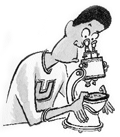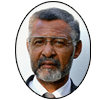



Six African-American Scientists Win Presidential Mentoring Awards
 Often the best strategy for increasing the numbers of black students in the scientific, engineering, and mathematics disciplines are strong mentoring programs. Mentors can help black students navigate the complexities of the science curriculum, offering guidance on course choices, research opportunities, summer internship programs, and their choice of departmental advisers. These types of programs are invaluable in making African-American college students more comfortable as they undertake a challenging course of study in the sciences.
Often the best strategy for increasing the numbers of black students in the scientific, engineering, and mathematics disciplines are strong mentoring programs. Mentors can help black students navigate the complexities of the science curriculum, offering guidance on course choices, research opportunities, summer internship programs, and their choice of departmental advisers. These types of programs are invaluable in making African-American college students more comfortable as they undertake a challenging course of study in the sciences.
Barack Obama has announced the 2009 winners of the Presidential Award for Excellence in Science, Mathematics, and Engineering Mentoring. The awards are given to scholars of any race who have played a major role in the academic and personal development of minority students in the hard sciences. Winners of these awards are honored at a White House ceremony and receive a cash stipend of $10,000.
Here are this year’s African-American winners of the presidential mentoring awards:
 • Goldie S. Byrd is chair of the department of biology at North Carolina A&T State University in Greensboro. She won a multimillion-dollar grant from the National Center on Minority Health and Health Disparities to establish genetics research on racial differences in Alzheimer’s disease.
• Goldie S. Byrd is chair of the department of biology at North Carolina A&T State University in Greensboro. She won a multimillion-dollar grant from the National Center on Minority Health and Health Disparities to establish genetics research on racial differences in Alzheimer’s disease.
 • Lesia Crumpton-Young is a professor of industrial engineering and management systems at the University of Central Florida in Orlando. She has served as a mentor to nearly 300 undergraduate and graduate students and 35 junior faculty members. She also participates in engineering outreach programs for students in the K-12 years. She works in the mentoring programs of the Society for Women Engineers and the National Society of Black Engineers.
• Lesia Crumpton-Young is a professor of industrial engineering and management systems at the University of Central Florida in Orlando. She has served as a mentor to nearly 300 undergraduate and graduate students and 35 junior faculty members. She also participates in engineering outreach programs for students in the K-12 years. She works in the mentoring programs of the Society for Women Engineers and the National Society of Black Engineers.
 • Patricia A. DeLeon is a professor of biology and faculty representative on the board of trustees at the University of Delaware. Her research involves genetic causes of male infertility. Professor DeLeon has mentored more than 100 trainees, including undergraduates, graduate students, postdoctoral fellows, and visiting scientists from around the world. A large majority of the people she has mentored are women and about one third are minorities.
• Patricia A. DeLeon is a professor of biology and faculty representative on the board of trustees at the University of Delaware. Her research involves genetic causes of male infertility. Professor DeLeon has mentored more than 100 trainees, including undergraduates, graduate students, postdoctoral fellows, and visiting scientists from around the world. A large majority of the people she has mentored are women and about one third are minorities.
 • Ashanti Johnson is an assistant professor of chemical oceanography at the College of Marine Science of the University of South Florida in St. Petersburg. She is the founder of the mentoring organization Minorities Striving and Pursuing Higher Degrees of Success in Earth System Science.
• Ashanti Johnson is an assistant professor of chemical oceanography at the College of Marine Science of the University of South Florida in St. Petersburg. She is the founder of the mentoring organization Minorities Striving and Pursuing Higher Degrees of Success in Earth System Science.
 • Cato T. Laurencin is the Lillian T. Pratt Distinguished Professor and chair of the department of orthopaedic surgery at the medical school of the University of Virginia. Working at several university teaching hospitals, he has mentored hundreds of future physicians and surgeons.
• Cato T. Laurencin is the Lillian T. Pratt Distinguished Professor and chair of the department of orthopaedic surgery at the medical school of the University of Virginia. Working at several university teaching hospitals, he has mentored hundreds of future physicians and surgeons.
 • Kennedy Reed is a theoretical physicist at the Lawrence Livermore National Laboratory in California. The lab is affiliated with the University of California. He has been a leader in programs to increase the number of blacks and other minorities in physics. He founded Livermore’s research collaboration program with black colleges. Dr. Reed was also instrumental in the founding of the National Physical Science Consortium.
• Kennedy Reed is a theoretical physicist at the Lawrence Livermore National Laboratory in California. The lab is affiliated with the University of California. He has been a leader in programs to increase the number of blacks and other minorities in physics. He founded Livermore’s research collaboration program with black colleges. Dr. Reed was also instrumental in the founding of the National Physical Science Consortium.
![]()
Copyright © 2009. The Journal of Blacks in Higher Education. All rights reserved.